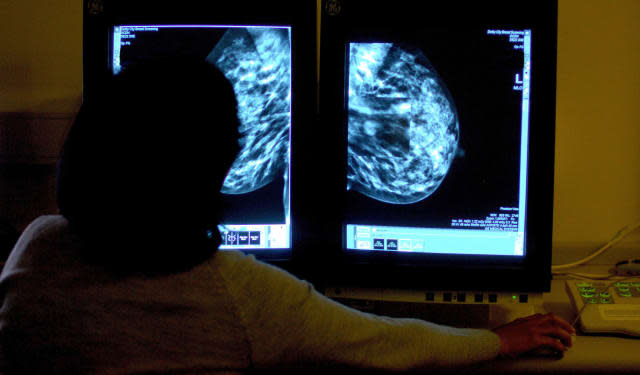Breast cancer screening programme concerns 'raised last year'

Concerns over the breast cancer screening programme were escalated to a senior health official last year, it has been claimed.
Health Secretary Jeremy Hunt revealed on Wednesday that 450,000 women aged 68 to 71 had not been invited to their final routine screening.
An independent review has been launched into the computer error, which Mr Hunt said was discovered in January and dates back to 2009.
However, as early as March 2017 two NHS trusts in London and the West Midlands raised concerns some women were not being invited for mammograms.
Hitachi Consulting said at the time it was a local problem and the full scale of the issue was not realised until January, Public Health England (PHE) said.
But according to a source, tests revealed the software was working as designed and the concerns were escalated to a senior PHE official overseeing the programme.
Some women aged between 70 and 79 are being offered the opportunity for a breast screen. This is because some women did not receive an invitation for a final screen, as part of the routine NHS Breast Screening Programme. Find out more here: https://t.co/Ka0ZWZDv3fpic.twitter.com/5QPf5EJa3p
-- NHS Choices (@NHSChoices) May 2, 2018
Hitachi Consulting has denied it is responsible for the blunder, which Mr Hunt said may have led to up to 270 women having their lives cut short.
PHE said it was "100 percent focused on providing advice and support" to those not invited to their final screening.
A Hitachi Consulting spokesman said: "Hitachi Consulting has no responsibility for the error that has led to this situation.
"The software responsible for inviting patients for breast cancer screening was written by others and implemented in 2009, fully six years before Hitachi Consulting began working with Public Health England.
"Hitachi Consulting was engaged in late 2015 merely to maintain and support the system as designed, and has had no responsibility for decisions made on which patients should be selected for screening.
"Our hearts go out to those people and their families who may have been affected."
A PHE spokesman said: "We are very clear that the problem was first identified as a national issue in January 2018 following analysis of anomalies in data for the Age X trial.
"We will share all information about PHE's role and how we work with NHS England and NHS breast screening services with the independent review and therefore we won't be commenting further."
More than 10,000 calls have been made to a dedicated helpline for those affected, while charity Breast Cancer Care said it had also seen increased demand on its own helpline.
Women in England between the ages of 50 and 70 are currently automatically invited for breast cancer screening every three years.
Of those who missed invitations, 309,000 are estimated to still be alive and all those living in the UK who are registered with a GP will be contacted before the end of May.
All women who were not sent an invitation for their final screening will be given the opportunity to have a new appointment.
However, Mr Hunt said "administrative incompetence" meant some families may have lost, or may be about to lose, a loved one to cancer.
Duncan Selbie's Friday message focuses on the NHS breast screening story: https://t.co/FyYO3nZLje
-- PublicHealthEngland (@PHE_uk) May 4, 2018
Women and the families of those who may have been affected by the failures have demanded answers over the failures.
Widower Brian Gough said his wife Trixie did not receive a letter inviting her to go for a screening in 2009.
A scan in October 2010 revealed she had stage-three breast cancer.
The 77-year-old, from Norfolk, told the Press Association he was "shell-shocked" by the news.
"There has always got to be some blame, these things don't just happen... it is never the computer that goes wrong, it is the person that put the information in or took it out," he said.
Dame Elizabeth Anionwu, emeritus professor of nursing at the University of West London, believes she is one of those affected by the error.
The 70-year-old's last mammogram was in 2013, but she did not receive an invitation for her next screening in 2016.
Dame Elizabeth, who previously worked in the NHS, said women were "reliant on the system", adding that it had not "struck" her she had not received an appointment.
She said: "If a system has been set up, you can understand how time can pass.
"You know, we've got lives to live, we are not waiting every morning for our breast screening appointment."
The official helpline for those who think they may be affected is 0800 169 2692.


